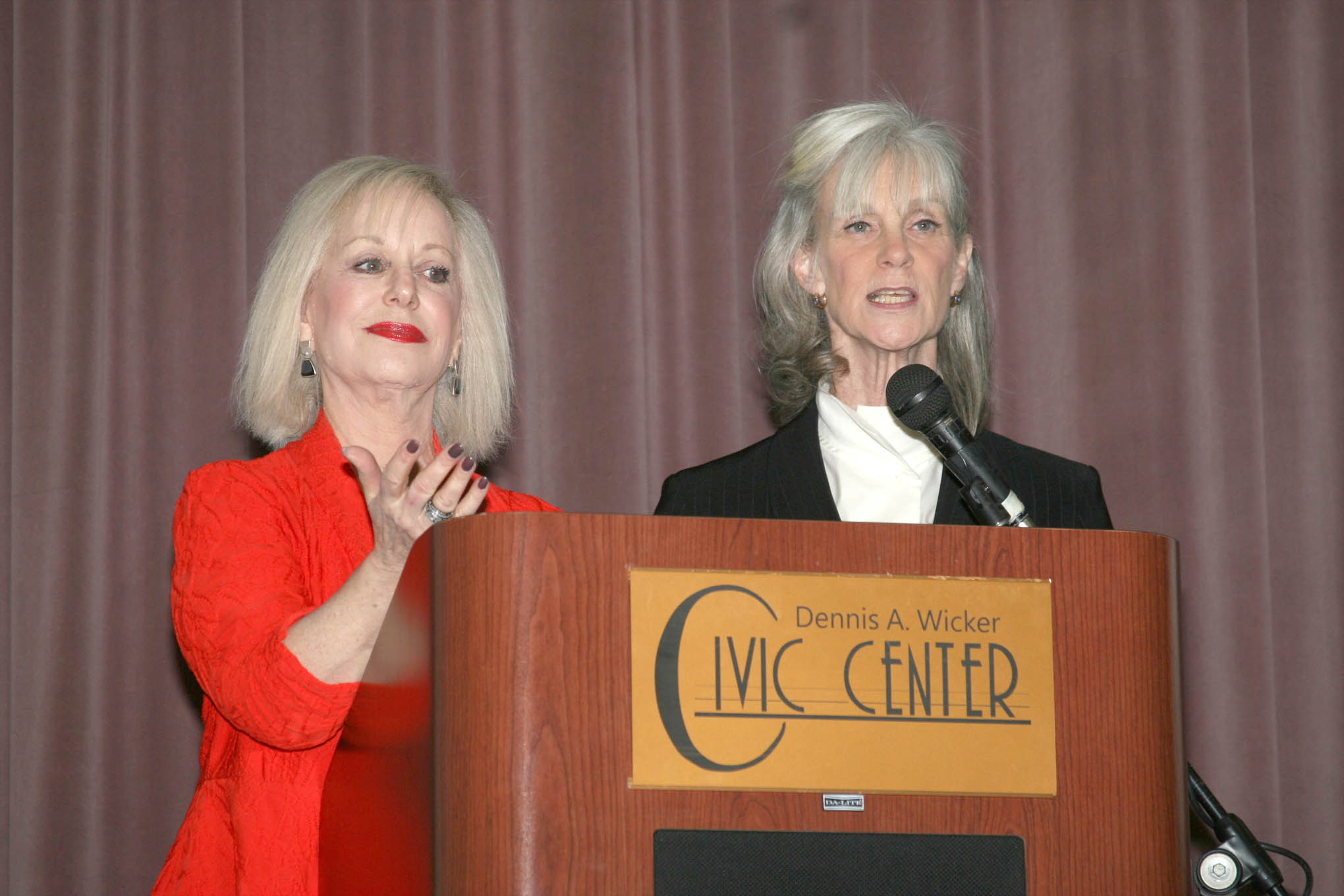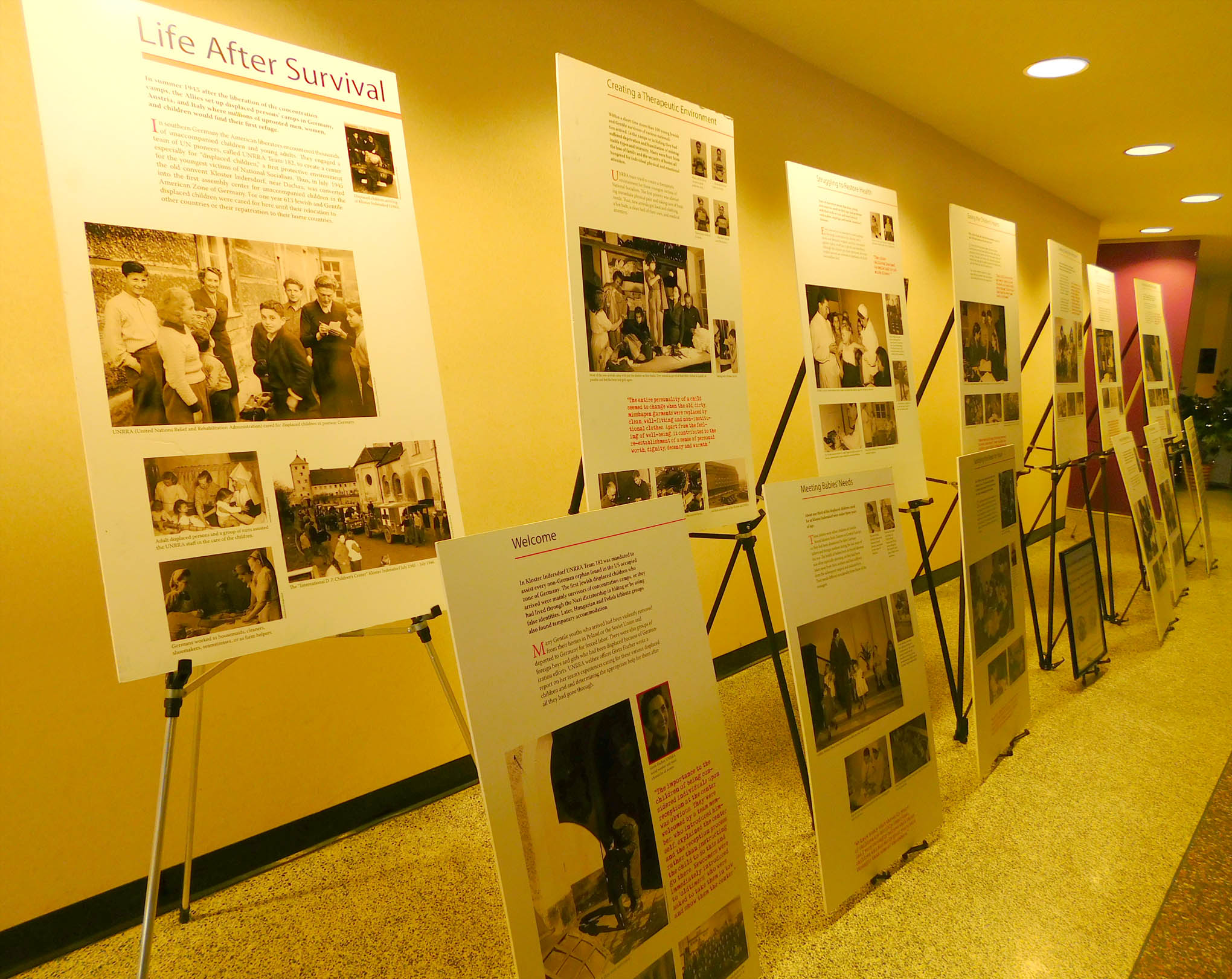College News
CCCC hosts Holocaust Remembrance Event
Notice: This article is older than 12 months. Names, contact information, programs, titles, etc. might have changed. If you have any problems please call the main college number, 1-800-682-8353, and we will be happy to direct you accordingly.

click image to enlarge ⊗
Rose Mills (left) and Sharon Halperin are children of Holocaust survivors who spoke during the Holocaust ... (more)

click image to enlarge ⊗
An exhibit, "Life After Survival," provided by the North Carolina Council on the Holocaust, was part ... (more)
04.09.2018 • College & Community • College General • Special Events
SANFORD - Separated from his wife when war broke out, David Mielzynski was hopelessly trapped on the outskirts of Berlin.
He had been a slave laborer in a Nazi factory until he escaped and found refuge in the apartment of a Christian friend, who risked his own life to hide David from the rising threat. When that became far too dangerous for everyone, David slipped into his friend's tool shed in the woods.
One year passed, and he never left his tiny shed just two miles from SS headquarters, a building from which Germany's Jewish genocide was being organized. A second year passed. And a third.
Only once, when a bomb landed without exploding in the rain-softened ground just outside, did David leave his shed. And, even then, only as long as absolutely necessary. When the bomb was finally disarmed, he returned.
With little food and human contact, he survived for three and a half years until the Allies liberated Germany and brought an end to World War II. David left his hiding place a free man and emigrated to the United States, where he was reunited with his wife, Elizabeth. They changed their last name to Mills, moved to Chicago and began a brand new life.
The story was recounted by the couple's daughter, Rose Mills, one of two children of Holocaust survivors who took a contemporary audience back into one of the darkest periods of history during the Holocaust Remembrance Event at Central Carolina Community College.
Part of a cultural series for university transfer students, but open to community members, the fifth-annual presentation was held on March 26 at the Dennis A. Wicker Civic Center.
Her father's story was harrowing, but at least he survived. Rose also remembered those who didn't -- elderly grandparents, who were deported from Germany to Poland and simply disappeared, and other relatives who were sent to die in concentration camps.
"There is a first-hand account by a man who somehow survived the massacre," she said of events in Kazimierz Biskupi, a village in Poland where her grandparents were last known and likely perished. "But the story of how some of these innocent Jews died is too terrible to describe here."
Before Rose took the stage, her friend, Sharon Halperin, provided some cultural context. In a brief presentation titled "Judaism 101," Sharon gave a succinct overview of the Jewish religion and culture.
Sharon also is the daughter of two Holocaust survivors. Her mother survived by living in the forests of Poland. Her father escaped from the Riga Ghetto in Latvia, when he was sent with a group to dig ditches in a nearby forest. Both fled during the war and met in Russia, where they were married.
In little more than 15 minutes, Sharon moved from basic questions like "Who is a Jew?" to details on essential religious practices and major life celebrations. But the one thing she wanted everyone to remember came from a more philosophical point made early in her presentation.
"If you remember anything from my part of this program, I hope it is that Judaism teaches us to respect and love all people, regardless of religion, race, ethnicity or culture," she said. "We want, above all, to live in peace, to exchange knowledge and skills, and to help those less fortunate than ourselves."
After their 45-minute presentation, the two representatives from The Center for Holocaust, Genocide and Human Rights Education of North Carolina took questions, and it was the first time you could hear a noise from the audience -- except for occasional gasps as Rose told her family story.
Questions ran the gamut, from details about the family stories to what lessons can be drawn at a time when hate crimes are on the rise once again.
Both believe that Holocaust events like this can remind people about the dark periods of history -- so nobody has to experience them again.
Before and after the presentations, visitors stopped in the civic center lobby, staring into the faces of young Holocaust survivors. The images, part of an exhibit titled, "Life After Survival," told the story of young survivors immediately after the war.
One especially poignant panel displayed small photos of 185 survivors at Kloster Indersdor, a convent near Dachau that became a temporary home to hundreds of displaced children after the conflict. Other exhibit panels combined quotes and photos from 1945 to tell the story of how United Nations relief workers helped survivors regain health, resume their education and try to find any surviving relatives.
The exhibit was provided by the North Carolina Council on the Holocaust.
For information about Central Carolina Community College and its programs, visit its website, www.cccc.edu or call the college at 919-775-5401.
Categories
- Admin, Faculty & Staff Category
- Arts & Entertainment Category
- Clubs Category
- College & Community Category
- College General Category
- Continuing Education Category
- Curriculum Programs Category
- Distance Education Programs Category
- Facilities/Buildings Category
- Finances Category
- Foundation Category
- Graduations Category
- Lee Early College Category
- NCCCS Category
- SGA Category
- Special Events Category
- Sports Category
- Students/Graduates Category
- Uncategorized Category
Archives

